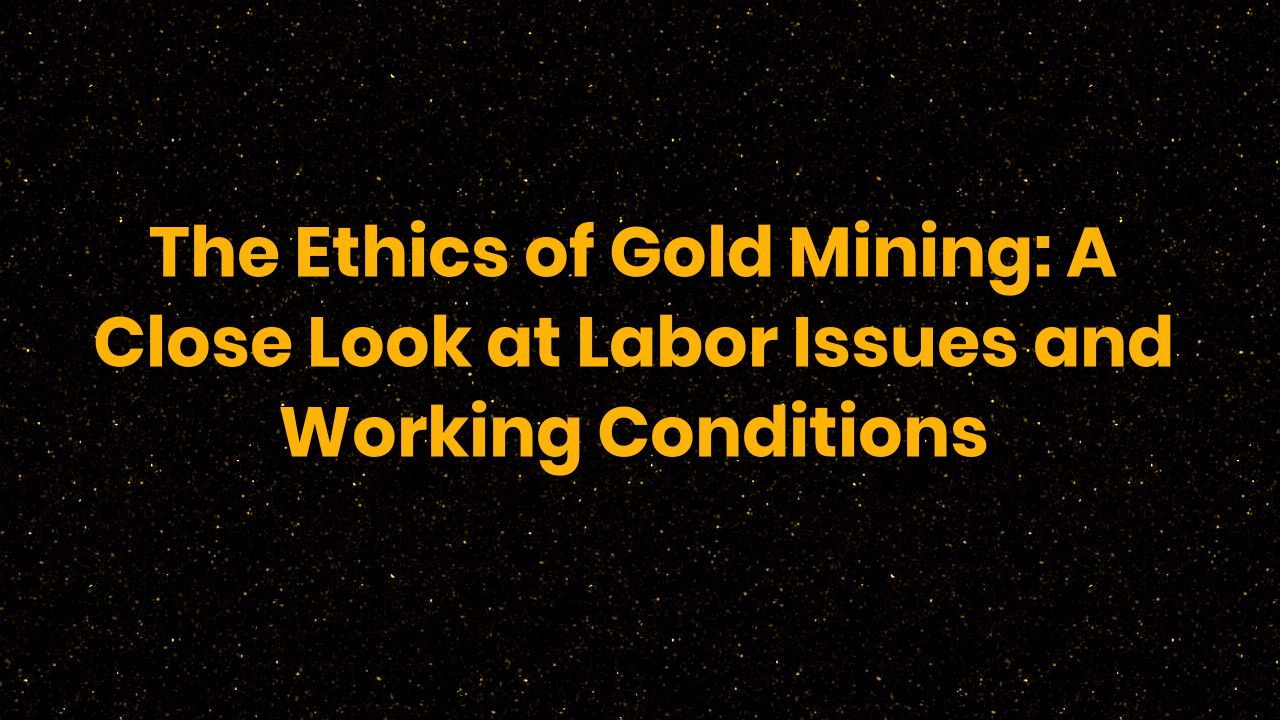
Table of Contents
Introduction to the Ethics of Gold Mining
Gold mining is a highly profitable industry that draws many investors and consumers alike. While the industry’s economic benefits cannot be ignored, the labor issues, working conditions, and environmental and social concerns associated with mining gold have been highly debated. It is essential to analyze and understand these concerns since they represent an ethical obligation on the part of mining companies to behave ethically, as well as on the part of consumers to purchase ethically-sourced goods. This blog will delve into the ethics of gold mining by examining labor issues, working conditions, environmental concerns, and the social impact on local communities while also discussing the industry’s future and corporate responsibility.
The History of Labor Issues in Gold Mining
Gold mining has been marked by labor issues that have defined the industry’s history. In the 19th century, miners were subject to dangerous and unhealthy working conditions, long hours, and low wages. These working conditions led to the formation of trade unions by miners seeking better living standards. Today, labor exploitation and human rights violations continue to plague the industry, particularly in developing countries. Children, women, and migrant workers have been exploited with little to no government oversight or worker protections. It is imperative to acknowledge the history of labor issues in the gold mining industry to recognize the need for ethical standards to hold corporations accountable.
Working Conditions in Modern Gold Mines
Modern gold mines have witnessed significant progress regarding working conditions over the past century. Governments and mining companies have implemented measures to improve safety and health conditions in mines worldwide. However, despite these efforts, gold mines remain one of the most dangerous working environments globally, with accidents and fatalities occurring regularly. Furthermore, mine workers in developing countries are often poorly paid and work long hours with little job security. Providing decent pay, safe work environments, and improved social benefits is an essential aspect of an ethical mining industry.
The Impact of Gold Mining on Local Communities
The social and environmental impact of the gold mining industry on local communities has become a critical concern. Gold mining often leads to the displacement of indigenous communities and other marginalized groups, along with environmental degradation that harms wildlife, vegetation, and water resources. Gold mining operations affect the health and well-being of communities through significant pollution of air and water in some areas. Ethical gold mining must take into account the social and environmental impact on surrounding communities and strive to maintain good relationships with these communities.
Corporate Responsibility in the Gold Mining Industry
Mining companies are responsible for the ethical treatment of workers, the promotion of human rights, and the protection of the environment. Companies should carry out their business practices in a manner that promotes sustainable economic development, respecting human rights, and protecting the environment. Whistleblower protection and anonymous reporting mechanisms should also be put in place to enable employees to report any violations of ethical standards. It is crucial to ensure that mining companies adhere to such ethical standards and are held responsible for their social and environmental obligations.
Environmental Concerns in Gold Mining
Gold mining operations have significant environmental impacts. Mining creates both direct and indirect environmental damage, such as land degradation, deforestation, soil and water contamination, and biodiversity loss. Mining also contributes to greenhouse gas emissions and climate change, threatening local ecosystems and global biodiversity. Mining companies must adhere to strict environmental regulations and implement environmentally friendly practices, such as the use of renewable energy and the promotion of responsible waste management solutions such as recycling.
The Role of Consumer Demand in the Gold Industry
Consumer demand is crucial in shaping the future of the gold mining industry. More and more consumers are seeking ethically-sourced gold that is purchased from responsible sources. Independent certifications and tracking systems can help ensure that the gold consumers purchase is produced in an ethically and environmentally conscious way. By purchasing ethically-sourced gold, consumers can exert pressure on mining companies to meet higher ethical standards, promoting a more sustainable and responsible gold mining industry.
The Future of the Gold Mining Industry and Ethical Standards
The gold mining industry must develop an ethical approach to address environmental and social concerns. As the pressure on mining companies to meet higher ethical standards increases, those companies investing in ethical practices will become the leaders in the industry. Mining companies that prioritize human rights and environmental protection will enjoy long-term operational sustainability through responsible investment, leading to increased consumer demand and brand loyalty. Ethical standards in gold mining will also be subject to new regulations, requiring mining companies to comply with stricter monitoring, reporting, and auditing.
Summary and Conclusion
The ethics of gold mining depend on the labor issues, working conditions, environmental concerns, and social impacts on local communities. A responsible and sustainable gold mining industry must take into account these ethical concerns and implement measures to address them. Mining companies have a responsibility to implement ethical standards, improve the quality of life of mining communities, and reduce the impact of their operations on the environment. Consumers can support these efforts by seeking and purchasing ethically sourced gold. An ethical approach to gold mining promotes long-term sustainability and social responsibility, leading to a more sustainable industry that benefits all stakeholders.





